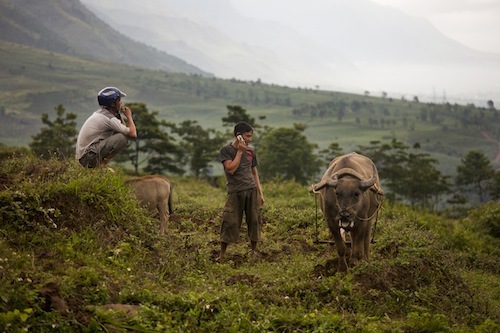The video is unsettling: A Vietnamese tourist on his knees begging a Chinese storeowner in Singapore for his money back after trying to purchase an iPhone 6. Within minutes the video goes viral, capturing headlines across Asia.
Rarely does a story such as this reflect so many aspects of modern life in the region all at once.
Earlier this month Pham Van Thoai, a factory worker from Ho Chi Minh City, was in Singapore on vacation with his girlfriend. The two entered Mobile Air, one of dozens of electronics stores in Sim Lim mall, where Pham, 28, hoped to buy the coveted phone as a birthday gift for his partner.
After paying about US$600 for the phone, Pham was then told he would have to pay an additional $1200 for a warranty or leave without the phone - and his money. Pham had apparently signed a contract in English - which he can't read.
It's a scam by the owner who has reportedly been cashing in on the growing number of naive tourists like Pham, who tearfully told him that he makes only $200 dollars a month as a factory worker. He had, he said, borrowed money to go to Singapore.
With no money, and no phone, he went down on his knees and begged for his refund, and the owner, Jover Chew, laughed. The scene was captured by another customer with a smartphone. Soon thereafter the story of a man on his knees because of an iPhone rode the news curve across East Asia.
Reactions ranged from sympathy to scorn. In Singapore fears of tarnishing the country's erstwhile spotless image drove local businessman Gabriel Kang to launch an online campaign raising funds to purchase another iPhone for Pham. Tapping into the shared sense of national shame, Kang pulled in $14,000 on the first day.
"This is not OK, this is not right. We are not a nation of thieves and cheats," Kang told the told the Sydney Morning Herald.
Singaporean netizens went after the storeowner, meanwhile, exposing details of his private life, including posting private photos of the man online. Chew's store had apparently received 18 complaints in the last 10 months. In one instance, Chew refunded a disgruntled customer with a bag of coins totaling close to $1000.
Indeed, while shame went around the region, for Vietnamese it was especially pronounced. By prostrating himself in front of Chew, an ethnic Chinese, Pham unwittingly mirrored Vietnam's long subservient and exploited role in its relations with China. That relationship has been made more fraught by growing tensions involving a territorial dispute between the two nations.
"Singaporean owner forced Vietnamese tourist to kneel and beg for his iPhone," read a skewered headline out of Vietnam to which one reader declared, "What a shameful thing to do. Are his ancestors Chinese?"
Others were more circumspect, seeing in the story a sign of the rampant commercial culture taking hold in Vietnam. "Vietnamese are enslaved to materialism," wrote one reader, while another posed this question: "Why would a man with a $200 dollar income need to buy a $1000 dollar phone?"
In Vietnam cellphones now outnumber the population itself: According to the latest statistics, there were 145 cell phones for every 100 Vietnamese in 2012. For a country with a population of around 90 million, there are more than 130 million active mobile phones, or nearly two per adult.
Since Vietnam joined the global economy, the cellphone has become the universal status symbol. Everyone from the poor factory worker to the rice farmer can afford one. But when it comes to status, there's little to compete with the latest iPhone.

Photo of Vietnamese farmer on his cell phone, by Robert Dodge, whose book of photography, Vietnam 40 Years Later. was published this year.
The hammer and sickle may still be on t-shirts sold to foreign tourists, but Vietnam's heart throbs for all things Apple. Yet while the popular brand has Vietnamese factory workers on their knees, in China the picture is more grim.
In September, a young Chinese poet named Xu Lizhi killed himself, jumping from his workers dormitory to his death. Xu was an assembly line worker for Foxconn, the Taiwanese manufacturer employing thousands of mainland Chinese in the Chinese city of Zhengzhou to make the majority of Apple's iPhones sold worldwide.
Xu's was the latest in a string of suicides of Foxconn workers that made news all the way back to 2010, prompting investigations into company practices described in a report by the South China Morning as resembling those of a "labor camp."
Xu's death and Pham's humiliation both point to a deep-seated malaise underlining Asia's hyper-consumerist culture, a collective suspicion that behind the frenzied appetite for all things new, something has been lost.
One of Xu's last poems offers fair warning to a world worshiping at the temple of the mall.
Youth stooped at machines die before their time
I swallowed the hustle and the destitution
Swallowed pedestrian bridges, life covered in rust
I can't swallow any more ...
Andrew Lam is an editor with New America Media and author of "Perfume Dreams: Reflections on the Vietnamese Diaspora," and "East Eats West: Writing in Two Hemispheres." His latest book is "Birds of Paradise Lost," a short story collection, was published in 2013 and won a Pen/Josephine Miles Literary Award in 2014.
